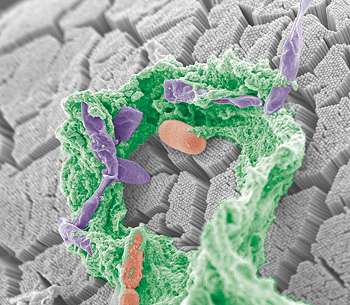May 30, 2013 report
Study suggests gut metagenome link to Type 2 diabetes

(Medical Xpress)—A team made up of researchers from Sweden and Denmark has found evidence of a possible link between gut metagenome and Type 2 diabetes. In their paper published in the journal Nature, the team describes how they compared the faecal metagenome of 145 European women with varying degrees of glucose intolerance against healthy individuals. In so doing, they found noticeable differences that suggest gut metagenomes might be a marker for Type 2 diabetes.
Diabetes is a metabolic disease that results in people having elevated blood sugar levels. It generally comes about either because the pancreas stops producing enough insulin, or because cells in the body stop responding to it. Prior research has suggested that the disease is likely caused by both hereditary and environmental factors, though the latter is believed to be responsible for its increasing incidence. Because it can cause so much damage to the bodies of patients that have it, much research has been conducted in attempting to find a cure. In this new effort, the research team focused on gut biota as a possible link.
To find out if diabetic patients have common types of gut biota that might serve as a marker, the researches collected faecal metagenome samples from 145 European women who were all 70 years old. The samples were divided into three different types: those that came from women that had Type 2 diabetes, those with a precursor and those that had no glucose intolerance.
The samples were studied and analyzed using a technique whereby the genetic makeup of the microbes from all of the samples could be studied together. In so doing, they found some patterns emerged. They noted specifically that some combinations of gut metagenome were more common in women with Type 2 diabetes. They also found some combinations that appeared distinct for women with a precursor and others for those that had no glucose intolerance.
Different gut metagenome makeup isn't believed to be a cause of diabetes, but it appears it can be used as a marker, helping to identify people that might be at risk. But, the researchers note, the combinations found in the European women might be different for women of the same age from another area. They note that a similar study done in China found combinations in women there that appeared to serve as a marker as well, but were not the same as the types found in the European study.
More information: Gut metagenome in European women with normal, impaired and diabetic glucose control, Nature (2013) doi:10.1038/nature12198
Abstract
Type 2 diabetes (T2D) is a result of complex gene–environment interactions, and several risk factors have been identified, including age, family history, diet, sedentary lifestyle and obesity. Statistical models that combine known risk factors for T2D can partly identify individuals at high risk of developing the disease. However, these studies have so far indicated that human genetics contributes little to the models, whereas socio-demographic and environmental factors have greater influence1. Recent evidence suggests the importance of the gut microbiota as an environmental factor, and an altered gut microbiota has been linked to metabolic diseases including obesity2, 3, diabetes4 and cardiovascular disease5. Here we use shotgun sequencing to characterize the faecal metagenome of 145 European women with normal, impaired or diabetic glucose control. We observe compositional and functional alterations in the metagenomes of women with T2D, and develop a mathematical model based on metagenomic profiles that identified T2D with high accuracy. We applied this model to women with impaired glucose tolerance, and show that it can identify women who have a diabetes-like metabolism. Furthermore, glucose control and medication were unlikely to have major confounding effects. We also applied our model to a recently described Chinese cohort4 and show that the discriminant metagenomic markers for T2D differ between the European and Chinese cohorts. Therefore, metagenomic predictive tools for T2D should be specific for the age and geographical location of the populations studied.
© 2013 Medical Xpress
















